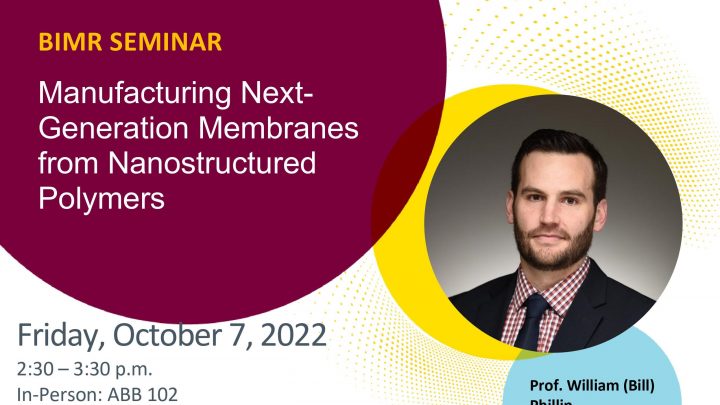Manufacturing Next-Generation Membranes from Nanostructured Polymers
Oct 7, 2022
2:30PM to 3:30PM

Date/Time
Date(s) - 07/10/2022
2:30 pm - 3:30 pm
Categories
William A. Phillip
Department of Chemical & Biomolecular Engineering
University of Notre Dame
Membranes represent a versatile separations platform that can help provide the growing global population with sustainable supplies of food, water, medicine, and energy. Here, we will discuss how block polymers can be processed into next-generation membranes that offer the possibility of precisely-controlled nanostructures and pore wall functionality. The majority of commercially-available membranes utilize size-based mechanisms to filter dissolved solutes from solution. These current commercial membranes are hindered by wide pore size distributions that compromise filtration efficiency. Block polymers are a promising membrane material due to the high density of well-defined pores that result from their self-assembly. We will describe how large areas of membrane can be produced from block polymers using a facile self-assembly and non-solvent induced phase separation (SNIPS) technique. As the performance of these nanostructured membranes pushes the limits of size-selective separations, there is an emerging interest in multifunctional membranes with deliberately-assigned pore wall chemistries. In this regard, the ability to control the performance of block polymer membranes through clever macromolecular design further demonstrates the promise of this materials platform. Here, the ability to produce membranes with pores lined by moieties that are thoughtfully tailored to effect selective separations through affinity-based adsorption will be highlighted. Specifically, the pore-lining groups are converted to coordinating ligands capable of high-affinity heavy metal capture. Finally, insights into how three-dimensional printing (3D printing) can be used to transform block polymers into filters with hierarchical organization across length scales will be mentioned. Through these examples, we will demonstrate that nanostructured polymers provide several opportunities for re-envisioning the design and fabrication of membranes that are molecularly engineered for myriad separation processes.
Biography:
William A. Phillip received his B.S. in Chemical Engineering from the University of Notre Dame in 2004; and completed his Ph.D. in Chemical Engineering under the guidance of Dr. Ed Cussler at the University of Minnesota in 2009. Following his Ph.D., Dr. Phillip completed a postdoctoral appointment with Dr. Menachem Elimelech at Yale University. He is currently the Rooney Family Collegiate Professor of Engineering in the Department of Chemical and Biomolecular Engineering at the University of Notre Dame, where he heads the Water purification and Advanced Transport Engineering Research (WATER) laboratory. Dr. Phillip is a member of the Editorial Advisory Board for ACS Macro Letters.
The WATER lab examines how the structure and chemistry of polymeric membranes affect the transport of solutes and solvents across them. By understanding the connection between functionality and property, Professor Phillip and his group are able to design and fabricate next-generation membranes that provide more precise control over the transport of chemical species. These material advantages are then leveraged to design systems capable of enhancing chemical separations at the water-energy nexus. The WATER lab has been recognized with the 3M Non-Tenured Faculty Award, the Army Research Office Young Investigator Program, the North American Membrane Society Young Membrane Scientist Award, the Rev. Edmund P. Joyce, C.S.C., Award for Excellence in Undergraduate Teaching, the Duncan and Suzanne Mellichamp Lectureship at Purdue University, and the FRI/John G. Kunesh Award.
Join Zoom Meeting
https://mcmaster.zoom.us/j/94682433834?pwd=NWVwR29KTmhGOWdVUkFSQytKQXZyQT09

